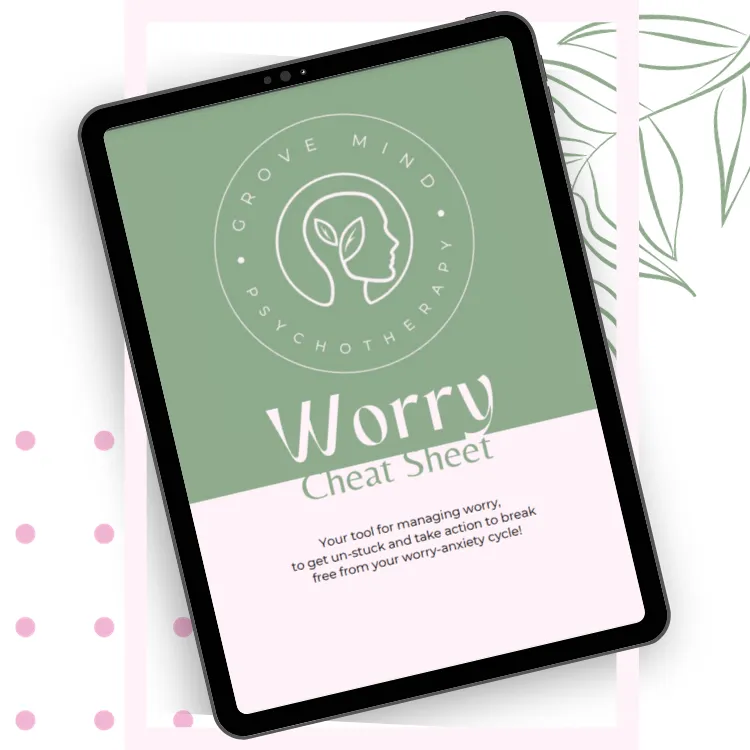BLOG
Acceptance & Commitment Therapy for Anxiety

This is How Reigniting Your Values in ACT Can Transform High Functioning Anxiety
“Your values are like a compass guiding you towards a meaningful and fulfilling life."
Anxiety can be all consuming, it can pull us away from the life we want to be living. We end up living a fear based life instead of one driven by our values. In Acceptance and Commitment Therapy (ACT) we help you to explore how values can become our guiding light, igniting a sense of purpose and fulfilment in our daily lives. As a side effect, anxiety will become a smaller part of our lives.

What are Values
At its core, values are like life's compass, helping us establish what truly matters to us. They act as guiding principles, steering our decisions and actions towards what brings us fulfilment. Even if that's difficult.
In their book "The Happiness Trap," renowned psychologist Russ Harris defines values as qualities of action that invigorate and enrich our lives, fuelling a sense of fulfilment and meaning. understanding and embracing our values become essential anchors that lead us towards a meaningful and purposeful life. By aligning our actions with our deeply-held values, we can embark on a transformative journey towards creating a life that truly reflects who we are. Anxiety, then, becomes a smaller part of our rich and meaningful lives.
Why Are They Important?
If we don't know what our values are, life can feel meaningless. Or, if we know what they are but are not acting on them, then we can feel discontent or even frustrated with ourselves.
Knowing our values and acting in line with them can be beneficial for our anxiety. When we act in line with our values our life grows and broadens, this means that anxiety is a smaller part of our life.
Also, values can act as:
Motivation for harder tasks in life.
Guidance for your purpose or calling in life.
An everyday life reminder of what is truly important to you.
A signpost of how you want to behave in different areas of life (work, home, etc.)
Values vs goals
Values are different to goals in that they are more constant. Goals are like heading west- you never get to "west", but you can head in a westerly direction. Goals are more like the things you tick off on the way for example you can stop at a specific town. You can complete this. You can't "complete" a value.
Values are an underlying direction for your life.
Example values
It can sometimes be tough to think of the right words to describe our heart's deepest desires. It will also take some time to figure out what words fit best with you.
Below is a list of values to use as a prompt:
1. Compassion: Showing kindness and empathy towards others.
2. Integrity: Acting with honesty and moral principles.
3. Curiosity: Pursuing knowledge, exploration, and new experiences.
4. Resilience: Bouncing back from adversity and facing challenges with determination.
5. Connection: Cultivating meaningful relationships and a sense of belonging.
6. Creativity: Expressing oneself through art, innovation, and imagination.
7. Growth: Continuously learning and evolving personally and professionally.
8. Authenticity: Being true to oneself and expressing one's genuine thoughts and feelings.
9. Gratitude: Appreciating and expressing thanks for the positive aspects of life.
10. Balance: Striving for a harmonious blend of work, leisure, and personal well-being.
If you want a more detailed list you can access this here.
Tips on Clarifying Your Values
1. Reflection: Carve out some quiet time to reflect on what truly matters to you in different areas of life—relationships, career, personal growth, and more. Jot down the people, activities, or qualities that truly resonate with you.
2. Experiment and Experience: Sometimes, clarifying values requires a hands-on approach. Actively pursue activities or experiences that align with your interests and core desires. Observe what brings you joy, fulfilment, and a sense of meaning.
3. Prioritise and Simplify: Pinpoint the top 3-5 values that truly drive you. Simplifying your values helps you prioritise and make decisions that are in harmony with your true self.
How to clarify your values
The best way to start is to write down your answers to the following questions:
Who do you care about? Who do you like to hang out with?
What matters to you?
What gets you fired up?
What inspires you? What infuriates you?
What makes you sad? Happy? Angry? Scared?
What do you enjoy? What “floats your boat”?
When do you feel grateful or appreciative? For what?
When do you feel you’re living life your way? Doing what?
Take tiny steps everyday in what you believe in, deep in your heart.
Values Cube
In Acceptance and Commitment Therapy (ACT), the "values cube" metaphor is used to describe how we prioritise our values. Imagine a cube with six sides, each representing a different domain in life. The sides of the cube may include domains such as family, career, health, personal growth, relationships, and leisure.

The idea is that at any given time, we have limited resources and energy to allocate towards different areas of our lives. Just like a cube cannot have all its sides facing forward simultaneously, we cannot give equal attention and focus to all our values at once.
In the values cube metaphor, we are encouraged to identify the values that are most important to us in the present moment. These values become the sides of the cube that are facing forward, while the other values temporarily take a backseat. For example, if we are experiencing a period of intense career growth, our career value might be prioritised as the side of the cube facing forward, with other values like health or relationships temporarily taking a less prominent position.
The emphasis in ACT is not on permanently sacrificing or neglecting certain values, but recognising that different values may take precedence at different times in our lives. The values cube metaphor encourages us to be intentional and conscious about the values we choose to prioritise in any given phase of our lives and make choices that align with those values.
Infuse your life with value
As you go about your day, pause and ask yourself why you are doing this particular thing. If you are at work you might be acting in line with values of stability or contribution. If you are brushing your teeth you might be acting in line with your value of health or self-care.
Once we take a second to reflect on why we are doing something, we do it with awareness and it can feel more fulfilling.
Check out this video for why your values are so important:
Troubleshooting: Overcoming Problems with Values
Navigating values can be a daunting task, especially for those with high functioning anxiety. Here are a few hurdles you might face, along with strategies to overcome them:
1. Analysis Paralysis: Feeling overwhelmed with choices and unsure which values are most important to you? The values you choose aren't set in stone. Try some "on" to see if they make sense for you. 3-5 is a good number of values to focus on, any more than this and we will struggle to attend to them all. Write them down and come back to review them after a few weeks.
2. Rules vs values: Don't get caught up in the 'shoulds' or 'musts'. Sometimes we take what society, our families, communities or culture tells us and let that dictate our own values. We will live a life of unfulfillment if we are always living to others expectations of us. Instead, ask yourself what would you be doing if no-one could see you do it? This will give your more insight into what you actually value.
3. Other person control strategies: e.g. “I want my husband to stop criticising" We cannot control others actions or what others value. We need to be clear that our focus is on what we can control and how we can respond. For the example about you could ask "What type of partner do you want to be in that relationship?".
4. Values conflict: If you feel that your values are conflicting it is more likely to be a time conflict. You cannot prioritise everything at once. A common example here is work and home, we can value both but our allocation of time might not feel right to us. Rather than trying to change your values, we need to get clarity on how much time we want to dedicate then enforce these boundaries.
Values act as beacons, empowering us to embrace our true selves and lead lives filled with purpose and fulfilment, despite the challenges anxiety may present.
So, let's embark on this adventure called life, anchored in our values, and watch as our anxiety takes a backseat in our beautifully imperfect, yet deeply meaningful, lives.
Getting clear on your values is so important for overcoming anxiety.
If you would like more in depth support with your values you can apply for 1:1 therapy here.
References
Harris, R. (2008). The happiness trap: How to stop struggling and start living.
Harris, Russ. ACT made simple: An easy-to-read primer on acceptance and commitment therapy. Oakland, CA: New Harbinger Publications, Inc., 2019.
© Copyright 2023 Grove Mind Psychotherapy - Privacy Policy - Terms & Conditions


